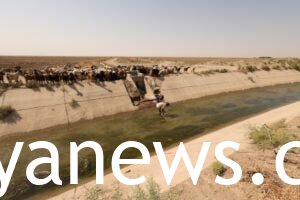Euphrates River Drying up: The Euphrates River, one of the world’s historic waterways, is facing a crisis of monumental proportions. Its waters, which have nourished civilizations for millennia, are diminishing at an alarming rate. This perplexing phenomenon carries not only environmental implications but also profound symbolism. Let’s delve into the 23 reasons behind the Euphrates River drying up and explore the deeper meaning embedded in this crisis.

1. Climate Change:
The overarching global issue, climate change, is altering precipitation patterns and intensifying droughts, affecting the Euphrates basin.
2. Dam Construction:
The construction of numerous dams along the river for irrigation and hydropower has disrupted the natural flow of the Euphrates.
3. Water Mismanagement:
Inefficient water management practices exacerbate the problem, leading to excessive water extraction for agriculture and other purposes.
4. Population Growth:
The burgeoning population in the Euphrates basin puts immense pressure on water resources, leading to over-extraction.
5. Deforestation:
Reduced vegetation cover due to deforestation contributes to increased evaporation and decreased groundwater recharge.
6. Upstream Water Usage:
Nations upstream, like Turkey and Syria, divert significant water for their own needs, leaving less for downstream countries like Iraq.

7. War and Conflict:
The region’s history of conflict has led to the destruction of water infrastructure, hindering water management efforts.
8. Oil Extraction:
Oil extraction processes in the region consume vast amounts of water, adding to the overall water stress.
9. Urbanization:
Rapid urbanization along the riverbanks leads to increased water demand for domestic use and infrastructure development.
10. Illegal Water Extraction:
Unregulated and unauthorized water extraction further depletes the Euphrates, as individuals and industries tap into its resources without oversight.

11. River Pollution:
Industrial and agricultural runoff pollutes the river, compromising water quality and ecosystem health.
12. Salinization:
Excessive irrigation coupled with poor drainage practices causes soil salinization, rendering the land less fertile and increasing water demand.
13. Hydropower Operations:
While dams contribute to water scarcity, the demand for hydropower also places stress on the river’s flow.
14. Infrastructure Development:
Large-scale infrastructure projects, such as roads and bridges, disrupt the river’s natural course and ecosystem.
15. Groundwater Depletion:
Over-extraction of groundwater in the Euphrates basin contributes to reduced base flow in the river.
16. Changing Land Use:
Alterations in land use patterns, such as converting agricultural land to urban areas, impact the river’s hydrological balance.
17. Invasive Species:
The introduction of invasive species alters the river’s ecological balance, affecting native flora and fauna.
18. Sedimentation:
Dams trap sediment, affecting downstream ecosystems and reducing the river’s capacity to carry nutrients.

19. Melting Glaciers:
Glacial meltwater from the Taurus Mountains contributes to the Euphrates’ flow, but climate change-induced glacier retreat diminishes this source.
20. Deteriorating Water Infrastructure:
Aging and poorly maintained water infrastructure leads to leaks and inefficiencies, compounding the water scarcity issue.
21. Lack of International Cooperation:
The absence of effective collaboration among countries sharing the Euphrates exacerbates water management challenges.
22. Legal Framework Gaps:
Inadequate legal frameworks for water management and transboundary agreements contribute to over-exploitation.

23. Symbolic Implications:
The drying of the Euphrates holds symbolic significance, reflecting humanity’s unsustainable exploitation of natural resources and the urgent need for global environmental stewardship.
Conclusion:
The plight of the Euphrates River is emblematic of a broader environmental crisis. Addressing the multifaceted reasons behind its drying requires concerted efforts at local, national, and international levels. As we grapple with the tangible impacts, we must also reflect on the symbolic message the Euphrates sends—a call for responsible environmental practices and a reminder of the interconnectedness of humanity and nature.
WRITTEN BY ALEX

